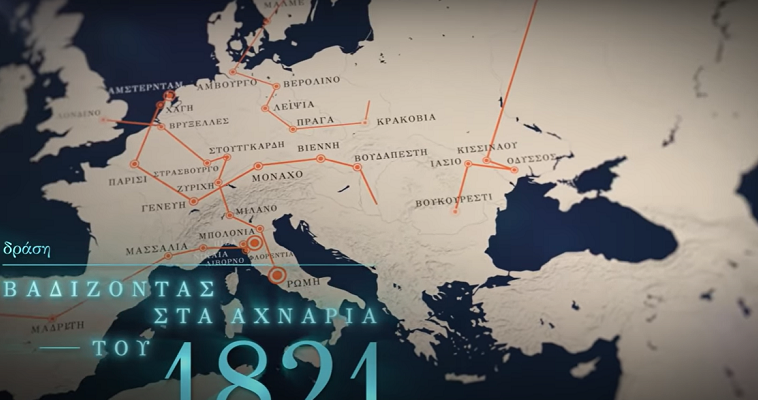Giorgos Margaritis: Historian Beaton tells us that Greek independence was given and not won with blood!
11/01/2021
As we are now in the bicentenial anniversary year, the positions, interpretations and views on what the Greek Revolution of 1821 was are multiplying. Some of these many interpretations, have an official and institutional character. In other words, they come from individuals, who have been officially assigned the configuration of the framework, in which the great historical event will be celebrated and marked.
Mr. Roderick Beaton, a prominent and founding member of Ms. Angelopoulou’s Committee, is one of these individuals. And of course the positions he expressed regarding the importance and character of the Greek Revolution and published on January 6 in Kathimerini, determine the fundamental framework in which the anniversary events will take place.
As befits international celebrities, Mr. Beaton begins his article by didactically teaching the Greeks. “Both the Greeks and the historians of the Greek Revolution have not understood what the” most crucial event” was, the “key chronology”,” the decisive moment “, as he defines it, of the Revolution.
No! Do not let your mind drift to the incursion of Ypsilantis in Moldovlachia, the fall of Tripolitsa, the key battle of Dervenakia, the exodus of Messolonghi, or other events like these. The “underestimated” historical moment “came on February 3, 1830, not on the battlefield, not even on Greek soil, but at a formal meeting that took place at the British Foreign Office in Whitehall. On that day, the Foreign Ministers of Great Britain, France, and Russia signed the so-called London Protocol.
The struggles of the Greeks are “insignificant”
Ah yes! How did this great moment escape us Greeks? The “great powers” of the time, for unknown reasons, perhaps because they loved Greece, decided “in a formal meeting”, obviously they did not have to don their best attire, that Greece will be an independent state from then on. Here is the big event!
What the Greeks did during those nine years, from February 1821 to February 1830, did not matter, Mr. Beaton emphasizes, what happened “on the battlefield” or “on Greek soil “. The struggles of the Greeks do not matter, in other words. It all starts with Europe and the West and it all depends on Europe and the West, Mr Beaton tells us.
The ideological background for the Greek uprising was “prepared in the 18th century, mainly by thinkers who wrote in French and German.” It is known in the history of Greek literature that “the” Prophecies of Agathangelos “were translated into Greek from French and German, as is the case with Greek folk poetry and the accompanying songs”!
As for Rigas Velestinlis, Korais, or the anonymous Greek, we definitely have copies and translations there. After all, the spirit belongs to the West as Hegel had defined it a little earlier! There is, in the perceptions of the Greeks, a kind of “disease”. A scientific “disease”, lest your mind goes to the pandemic we are experiencing!
The Greek “disease”
This “illness” is defined by Beaton as “exceptionalism” (sic). It was “contracted” by Greek historians, and not just, like Zambelios and Paparrigopoulos who considered that “the Greeks had formed a nation, even since antiquity.” I’m sorry, but this is not a matter of education, it is a matter of common sense. So what does Mr. Beaton imply?
That the Greeks of antiquity, from the dark ages of Homer to the Roman era, were not something distinct? What would we call that first language of Linear B? Wasn’t it Greek? And centuries later in medieval Hellenism, even through the theophobic perception of the world, were not the Greeks something distinct?
Of course, they were not called Greeks, but they spoke Greek and felt different from those who spoke Latin, Mongolian, Arabic, Slavic, or whatever. If it was not something distinct, then how did that millet, the Genos, the nation, come about in the Ottoman period? Did the conquering Turks invent it in the name of the “multiculturalism” that they are so well known for? But in the end, we shall all go mad from what we are hearing!
Certainly, in the long course of Hellenism through time, the Greeks took on various names, always with their presence as a substrate, as something special. They are still called Ionians (Yunan) by Turks, Arabs, and Chinese. Because they do not call us Hellenes, are we not Hellenes? The West calls us Greeks, the contemptuous nickname invented by the Romans. Do they not mean the Hellenes?
By saying that “Hellenic” in Byzantium meant “National”, i.e. the pagan and non-Christian, does it mean that there were no Hellenes and Hellenism in Byzantium? The only thing that is certain is that no Greek, no matter how he was called at the time he lived, ever turned his head to the call of “European”. But never say never, as Mr. Beaton interprets our cultural background, we may become accustomed to this as well! They “gifted” us the Greek state.
However, although denying the “exceptionalism” of Zambelios and Paparrigopoulos, Mr. Beaton finally accepts the existence of Greeks for 3,500 years. He even tells us that the new, what they brought from Europe, or rather what Europe “gave” them in 1830, is unprecedented, as it is a Greek state. The Greeks have never had a “Greek state” before.
This is probably a joke! Greeks in the last 3,500 years (at least we can agree on this) of their distinct presence established a lot, of all forms and kinds, states. Each state they created had the structure, the form, the function of what the state could be, at the time it was formed.
Obviously, in 1821, the state that the Greeks would claim and build could not be a Mycenaean kingdom, nor an ancient classical city, nor a Hellenistic hegemony, nor a feudal kingdom, nor anything else that belongs to another era. In the 19th century, states are built to 19th century standards. What in this is strange, what is extraordinary?
Why does this contradict the belief in “Greek resurgence”? The Greeks demanded their freedom and in this freedom, a key element was the right to build their own state, or their own states, if the conditions demanded it. Besides, they later built other states, in Crete, in Cyprus, in Pontos…
Aimed at Beaton
All this mixing up the self-evident, to the point where it ceases to be self-evident, has one goal: “What made the Greek Revolution really special was that from its infancy it was not only a matter of the Greeks.” So was it a European revolution? Did anyone revolt in Paris, London, Moscow?
No, but “the Greek revolutionaries asked for the help of the peoples and rulers of Europe,” argues Mr. Beaton. That is, the normal thing, in order to be able to talk about the Greek Revolution, would be for the revolutionaries to declare an uprising against all those who were not Greeks. That would be convincing for him!
Simple logic says that when you start a difficult fight, you are looking for allies and support. Mr. Beaton’s logic says here is the proof: the Greek Revolution is not a Greek revolution. It was a European revolution! The moral and at the same time political lesson follows:
“The Revolution was finally crowned with success, after many sacrifices, because the wisest and most insightful of the Greek leaders of the time realized the benefits of the internationalization of their struggle” and later concerning the naval battle of Navarino “it was a silent triumph of Greek diplomacy the notion that few Greeks took part in the battle and even fewer lost their lives “.
We were “saved” by the Great Powers
The Great Powers, the Western powers, the European powers, who give and take, at will, the freedom of peoples and nations! From the parlors of London, we ended up in the waters of Navarino and that was that! In between? Did anything happen in between?
Did the Greeks fight, did they curse, did they suffer, did they sacrifice and were sacrificed in this ocean of blood, that was the Struggle for Independence? The great powers, Mr. Beaton tells us, arranged it! Why did they arrange it? Why did the Greeks not submit, neither after Messolonghi nor after the defeat at the Battle of Athens? Why could the Turks and the Egyptians not defeat and subdue them?
Why did the Greeks, the many, carve the cause of their freedom so deep in history that diplomacy could only accept this reality? “Neither the Greeks nor the Ottomans had a say in these decisions,” concludes Mr. Beaton. And yet they had Mr. Beaton!
The struggle of the Greeks imposed the decisions of the Great Powers, dictated them, and forced the ministers to sign them. But was the 2021 commission set up for the struggles for freedom? But its aims are different and its goals are different. “Freedom” does not have a primary place in its vocabulary. For obvious reasons, of course.





